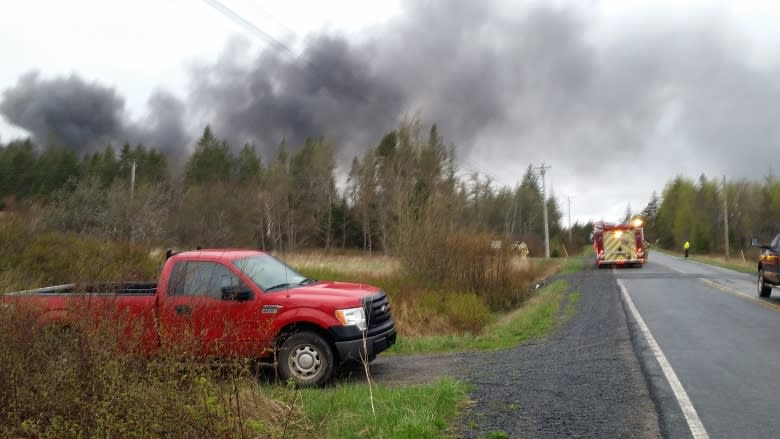Scrapyard owner blames tire fire on recycling program
It may have been the sparks from Danny McCulloch's power saw that caused a massive pile of tires on his property to ignite, but he lays the blame for the fire on Divert NS, the company that manages a provincewide tire recycling program.
About 1,000 tires caught fire at McCulloch's scrapyard, part of Country Hills Auto Sales and Recycled Parts, last Tuesday in Upper Rawdon, N.S. It took 15 fire departments seven and a half hours to put out the stubborn fire.
McCulloch said he was out with a chop saw cutting up cars just before the fire started.
"I guess some of the sparks that come off the chop saw must have got in some debris and stuff and garbage lying around, right. I never thought nothing of it."
After that, McCulloch went in for supper and then headed into his garage to do some work. That's when he noticed black smoke near a tire pile containing 1,000 to 2,000 tires.
He called 911 and watched as the tires burst into flames.
"The tire pile burnt some fast. It was just crazy how fast it happened. And anyway, by the time the fire department got there, it was raging pretty good," said McCulloch.
The fire was put out before it could spread far into the surrounding woods, and no one was hurt.
But McCulloch said the fire wouldn't have happened at all if Divert NS just did its job.
The not-for-profit corporation picks up used tires from salvage yards and tire retailers and brings them to a provincial recycling depot to be transformed into construction and engineering materials.
"If they had just kept taking them when they were supposed to take them, there wouldn't be none there. They would have been long gone."
McCulloch said the company last picked up tires from his site about two years ago. He said at that time, 540 tires were removed. Despite his calls, Divert NS never came to pick up the remaining tires, he said.
Divert NS disputes that.
"I can't comment on whether he called or not, but as a matter of policy, once we get one of those calls it's handed off to our hauler, and it's normally taken care of in an orderly fashion," said CEO Jeff MacCallum.
He said he didn't have the information on hand to tell when or if McCulloch was in touch with the company.
Once Divert NS receives a call for a tire pickup, their crews are on site within one to two weeks at the most, according to MacCallum.
"We're in the business of collecting and recycling the tires. The proper storage is really the onus of the business owner and they need to be following, I guess, the various fire codes and what have you," said MacCallum.
In 2015, the Environment Department issued a directive to McCulloch telling him that he had too many tires on his property and he had to have some removed. Environment Minister Iain Rankin said the salvage yard obeyed the directive.
Rules set down by the department state that used tires should be discarded at an approved tire collection facility at least once a year or at the discretion of an inspector. Some of the tires at McCulloch's salvage yard have been there for years.
New directive issued
Now McCulloch is facing even more heat from the department. It has issued a directive ordering McCulloch to remove the remaining tires and hire a professional environmental company to see if there was any environmental damage in the area.
The department is also doing a review to make sure the salvage yard is following all the terms and conditions of its operation.
Obeying the department of environment this time may be impossible for McCulloch. He said he doesn't have the money to pay for an environmental company to do an assessment on his property.
"My wife got cancer for five years and I'm broke now because of it," he said. "You can't get blood out of a rock. I don't know how they expect me to pay for it, but it ain't coming out of my bank account, that's for sure, because it ain't there."
McCulloch is planning on calling the department to try to find a solution. In the meantime, he thinks Divert NS and others should work harder to try and stay on top of tire removal.
"It's out of control. Like, if you're keeping them back out of sight, they don't seem to worry too much about them, right. Except for the environment coming after me all the time about getting rid of the tires. I did my part. I got them off the rim and got them ready for them in a pile," said McCulloch.




